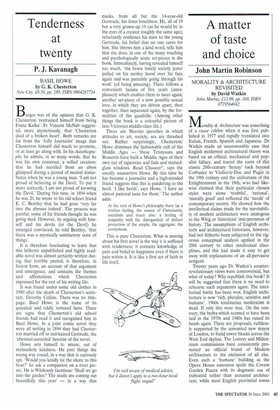Tenderness at twenty
P. J. Kavanagh
BASIL HOWE by G. K. Chesterton
New City, £8.50, pp. 189, ISBN 0904287734
Borges was of the opinion that G. K. Chesterton 'restrained himself from being Franz Kafka'. Fr Vincent McNab suggested, more mysteriously, that 'Chesterton died of a broken heart'. Both remarks are far from the 'Jolly Journalist' image that Chesterton himself did much to promote, or at least go along with. In his Autobiography he admits, in so many words, that he was his own construct, a willed creation; that he had recoiled from an abyss glimpsed during a period of mental disturbance when he was a young man. 'I am not proud of believing in the Devil. To put it more correctly, I am not proud of knowing the Devil.' During this time, in 1894 when he was 20, he wrote to his old school friend E. C. Bentley that he had gone 'very far into the abysses indeed'. The process was painful, some of his friends thought he was going mad. However, by arguing with himself and his devils (or the Devil) he emerged convinced, he told Bentley, that there was a mystically satisfactory state of things'.
It is therefore fascinating to learn that this hitherto unpublished and highly readable novel was almost certainly written during that terrible period; is therefore, in fiction form, an account of that argument and emergence, and contains the themes and affirmations which Chesterton expressed for the rest of his writing life.
It was found under some old clothes in 1989 after the death of Chesterton's secretary, Dorothy Collins. There was no titlepage; Basil Howe is the name of its quizzical and oddly tortured hero. There are signs that Chesterton's old school friends had read it and recognised him in Basil Howe. In a joint comic novel they were all writing in 1894 they had Chesterton married off to red-haired Gertrude, the `chestnut-aureoled' heroine of the novel.
Howe sets himself to amuse, out of melancholy kindness. He puts things the wrong way round, in a way that is curiously apt. 'Would you kindly tie the shore to this boat?' he ask a companion on a river picnic. He is Wildeanly facetious: 'Shall we go into the garden? The snails are coming out beautifully this year' — in a way that
masks, from all but the 14-year-old Gertrude, his inner loneliness. He, all of 19 but a very grown-up 19 (as he would be in the eyes of a creator roughly the same age), reluctantly confesses his state to the young Gertrude, his belief that no one cares for him. She throws him a kind word, tells him that she does, in one of the many touching and psychologically acute set-pieces in the book. Immediately, having revealed himself too much, the brave lonely society jester pulled on his motley hood over his face again and was patiently going through his work' (of being amusing). There follows a convenient lacuna of five years (unexplained) which enables them to meet again; another set-piece of a now possible sexual love, in which they are driven apart, then together, then separated again, by the formalities of the quadrille. (Among other things the book is a colourful picture of late-Victorian middle-class life.)
There are Shavian speeches in which attitudes to art, society, sex are thrashed out. Rather surprisingly, Chesterton/ Howe dismisses the fashionable cult of the Middle Ages — 'these Tennysons and Rossettis have built a Middle Ages of their own out of tapestries and fads and stainedglass windows. Read Chaucer!', says the usually unassertive Howe. By this time he has become a journalist and a high-minded friend suggests that this is pandering to the herd. 'I like herds', says Howe, 'I have an almost pastoral taste for them.' The author adds:
At the root of Howe's philosophy there lay a restless feeling, the source of Christianity, socialism and much else: a feeling of sympathy with the disregarded: of defiant protection of the simple, the aggregate, the anonymous.
This is pure Chesterton. What is moving about his first novel is the way it is suffused with tenderness; it contains knowledge of pain and belief in happiness even if there is pain within it. It is like a first act of faith in life itself.










































































 Previous page
Previous page